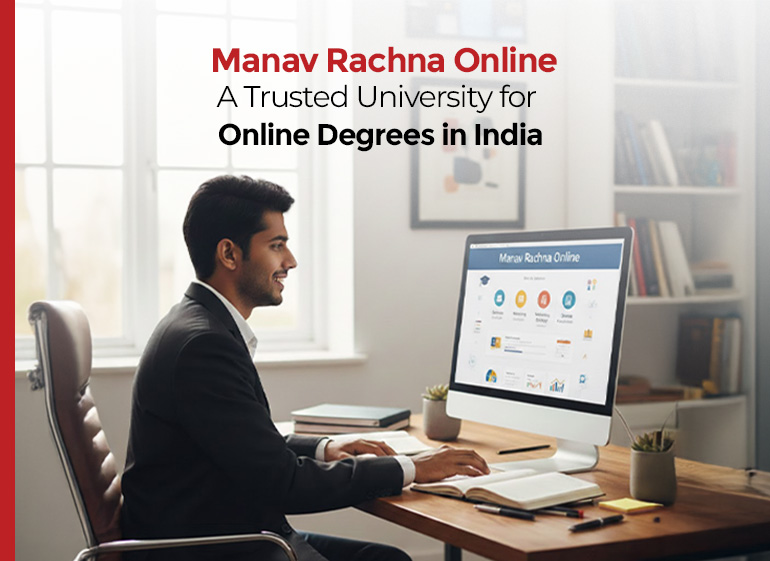Are Online Degrees Recognized? Myths vs. Facts
- No Comments

It is no wonder that myths have emerged about the validity and worth of online degrees. As more students and working professionals opt for flexible online learning options, these myths are bound to spread. Hence, it is time to separate fact from fiction. Let’s discuss the most common myths surrounding online degrees in India and compare them with traditional programs. You will make informed decisions about your future after knowing the facts.
Myth 1: Online Degrees Not Equivalent to Traditional Degrees
Fact: Online degrees approved by UGC in India are equivalent to normal degrees.
This is perhaps one of the most pervasive myths about e-learning: that online UG degree courses are inferior to their traditional counterparts. It originates from outdated perceptions of quality learning. Nevertheless, legitimate online degrees recognised by the UGC hold the same value as regular degrees in India.
The Indian government has put clear guidelines in place for online education. Thus, the accredited institutions have the same academic standards as their on-campus counterparts. The faculty and assessment methods are at par.
Online degree programs in India have the same standard curriculum as other traditional programs in several universities. For example, the Manav Rachna Centre for Distance and Online Education offers online degrees with the same curriculum as the conventional setup. The education will be on par with a classroom.
Myth 2: Online Degrees Have No Value in the Job Market
Fact: The value of a degree depends upon its accreditation and the institution that offers it.
A common misconception is that online university courses in India lack recognition among employers. This assertion is far removed from reality. In the contemporary job market, skills and qualifications are more significant than the learning method. Indeed, numerous industries now prioritise practical skills and problem-solving capabilities, frequently highlighted in online learning programs.
The most important variable in this case is accreditation. When an online program is accredited by prestigious outfits such as the UGC, it meets all academic and professional standards equivalent to a conventional degree. Many multinational organisations, even world leaders like Google, Amazon, and Microsoft, view online degrees positively because these institutions focus on skills.
For instance, some of the world’s most famous entrepreneurs, such as Marissa Mayer, former Yahoo CEO, and Richard Branson, owner of Virgin, have received great accolades for earning online degrees in addition to their successful careers, which proves that the quality and acceptance of online degrees is the same as on-campus degrees.
Myth 3: Online Degrees Lack Value in Society
Fact: Accredited online degree universities in India are considered equivalent to campus-based options.
Distance learning is another area that has faced a lot of criticism. Some still believe employers or universities do not recognise distance learning degrees.
However, this myth is rapidly fading as big educational bodies like the Manav Rachan Centre for Distance and Online Education continue producing highly employable graduates. These courses are carefully planned to provide students with the required flexibility while ensuring that the quality of education is at par with international standards.
Institutions that award accredited online UG degree courses in distance learning provide students with a more comprehensive education. Due to the growing flexibility in distance learning, working professionals can continue in employment and yet take relevant qualifications, which often enhances their employability.
Myth 4: Multinational Corporations Do Not Recognize Online Degrees
Fact: Multinational corporations care less about how the candidates are educated and more about the skills and experience of such candidates.
This attitude has shifted because many perceive MNCs ignore online degrees in India during recruitment. Major organisations have modified their hiring procedures to depend more on evaluating the candidate’s skills and experience than on how the candidate’s education is delivered. The shift to remote working and cross-country recruitment has resulted in a landscape where online schooling is slowly gaining acceptance.
Companies like Google, Amazon, and IBM have skills-based processes rather than traditional qualification methods. They realise online degree programs in India tend to focus on experience-based learning, where the acquired skills are employed directly to upgrade job performance. Consequently, companies are becoming more open-minded and less sceptical about an online degree. They find that the delivery method of getting an education does not devalue the quality of competencies the candidate possesses.
Myth 5: Online Learning Is Inferior to Traditional Learning
Fact: Both modes have advantages. Online learning is flexible and scalable. Traditional learning ensures face-to-face interaction.
However, the myth still exists that online education is somehow inferior to the traditional classroom model. This is, in fact, untrue. Each mode has its strengths. Traditional learning provides real contact with professors and fellow students, so instant feedback and social interaction ensue. In contrast, online learning has its strengths, notably flexibility and accessibility.
With the development of educational technology, online university courses in India are made interactive and interesting through live classes, discussion forums, and platforms driven by artificial intelligence. Many online programs incorporate synchronous learning approaches so that students interact with faculty and other classmates in real-time. Students can also access material and resources on their schedules, making education more accessible for those with restrictions based on work, family, or other geographical issues.
Conclusion
Online degree universities in India have ceased to be regarded as a secondary option for students. They are increasingly emerging as a popular and legitimate choice for individuals seeking quality education and opportunities for career advancement. The rising acceptance of online education underscores its significance. It is imperative to concentrate on the program’s accreditation and the skills that the program provides.
Remember, your degree’s worth is not determined by how you received it. Your commitment to learning and how well you apply what you have learned is more important. Online education is as valid and powerful as traditional education in today’s fast-changing world.





